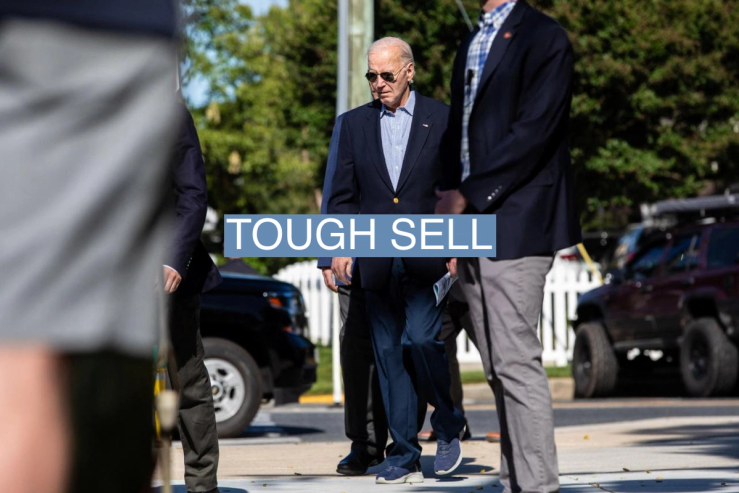The Facts
Joe Biden is currently down in the polls against Donald Trump, despite presiding over a US economy that, by most objective standards, is in far stronger shape than it was when some past presidents handily won re-election.
Voters awarded Barack Obama a second term in 2012 when unemployment was still near 8%. Ronald Reagan declared morning in America and won every state but Minnesota with a 7.4% joblessness rate and 4% inflation after it finished at 8.9% in his first year.
Biden, in contrast, has presided over a historic stretch of low unemployment while annual inflation has drifted to 3.3%, from a peak of 8.9% in June 2022. Measured by gross domestic product growth, the US has seen the strongest post-pandemic recovery of any major developed country. But in national polling averages, Biden is currently a 1-to-2 point underdog.
The consensus is that voters are punishing the president for how much the cost of living has risen overall since he took office. But even on that score, prices are only up slightly more under Biden (19.3%) than they were under Reagan at the same point in his term (18.5%).
The president’s inability to sell an economic revival story the same way as Obama or Reagan, despite having seemingly similar material to work with, has been a matter of exasperation for his supporters. As MSNBC host Chris Hayes put it Thursday: “The difference between ‘Morning in America!’ And ‘Everything Sucks!’ is, apparently, the last .8% of cumulative price change.” Some, like the prominent pro-Biden influencer Will Stancil, have pinned the blame on media “brainwashing.”
In this article:
Jordan’s view
There’s a much simpler explanation for why the president is having trouble telling a comeback tale, however. Americans are deeply unhappy about real aspects of the economy. But unlike his predecessors, Biden is struggling with a problem that started on his own watch.
Both Obama and Reagan were elected in large part to fix economic disasters that began under their predecessors — and never let voters forget it.
Obama could point out that he’d inherited the financial crisis and Great Recession from George W. Bush, and later argued that Mitt Romney would bring back the “very same policies that got us into this mess in the first place.” Republicans knocked him for trying to shirk responsibility for a slow recovery, but the rhetoric seemed to work (or at least matched the public’s view). From the time he was first elected all the way through 2016, polls consistently showed that voters were less likely to blame Obama for the country’s economic woes than Bush.
Reagan beat Jimmy Carter, meanwhile, in part by promising to tame 12% inflation and repair a wrecked job market. As his polls sagged amid a double-dip recession, he reminded voters that he’d taken office amid “the worst economic mess since the days of Franklin Roosevelt.” But by 1984, with inflation relatively back to normal and unemployment trending down, he had a much simpler case to make: Voters were in fact much better off than than four years before.
Biden doesn’t have an easy before and after story to tell since inflation took off a few months into his presidency, during the spring and summer of 2021. The extent to which his policies are actually to blame for that fact is still controversial; the entire world experienced an inflationary surge as economies opened from the pandemic, but stimulus-driven demand almost certainly added some fuel to the fire in the US. Exactly how much is still in question.
What isn’t up for debate is that Donald Trump was no longer around when food prices turned into a hockey stick graph.
Biden has somewhat awkwardly tried to fudge that economic timeline, suggesting twice that inflation was at 9% when he came into office. The fact checkers had a field day in response. Voters and the press have similarly not been too impressed with Democrats’ efforts to blame Trump, who the DNC has likened to Herbert Hoover, for job losses during the pandemic.
The fact that inflation soared under Biden might not be as daunting a political problem for the White House if it could easily pin it on another villain. But the president’s attempts to blame inflation on “corporate greed” and price gouging don’t seem to have helped his approval rating. That’s not necessarily because voters disagree with the sentiment: Polling by Navigator Research has found that 59% of Americans believe corporate greed is a major cause of rising prices.
The problem is that they still blame Biden for their McDonald’s receipts, too: in the same poll, 59% percent said government spending was also a major factor in inflation. Recent polling from the Cook Political Report’s Swing State Project, meanwhile, found most Americans believe the president has at least some control over the cost of living, and that it was more likely to keep rising under Biden than Trump.
It’s hard to spin a comeback story when voters think the president is trying to recover from shooting himself in the foot.
Room for Disagreement
Not everyone thinks blaming the last guy is a brilliant political strategy. In a 2021 paper, Temple University political scientist Michael Sances found that voters tend to start giving presidents full credit or blame for the economy early on in their first term. Others have tried to make the case that Biden really is contending with a reality distortion field created by an increasingly dour media; a recent Brookings report found that, since 2018, the tone of economic coverage has been far more negative than actual economic data would predict.


